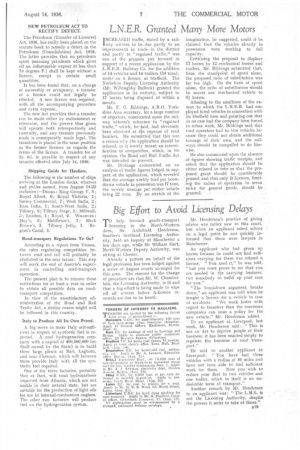L.N.E.R, Granted Many More Motors I NCREASED traffic, stated by a rail
Page 25

If you've noticed an error in this article please click here to report it so we can fix it.
way witness to be due partly to an improvement in trade in the district and partly to "regained traffic," was one of the grounds put forward in support of a recent application by the L.N.E.R. Railway Co. for the addition of 14 vehicles and 14 trailers (34 tons), under an A licence, at Sheffield. The Yorkshire Deputy Licensing Authority (Mr. Willoughby Bullock) granted the application in its entirety, subject to 17 horses being disposed of within a month.
Mr. F. G. Bibbings, A.R.O. Yorkshire Area secretary, for a large number of objectors, commented upon the railway witness's refe ence to "regained -traffic," which, he, $aid, had obviously been obtained at t e expense of road hauliers. He submitted that this was a reason why the application should be refused, as it merely meant an intensification of competition, which, in his opinion, the Road and Rail Traffic Act was intended to prevent.
Mr. Bibbings commented on an analysis of traffic figures lodged in support of the application, which revealed that the average weekly load per horsedrawn vehicle in possession was 17 toes, the weekly average per motor vehicle being 22 tons. By no stretch of the imagination, he suggested, could it be claimed that the vehicles already in possession were working to full capacity.
Criticizing the proposal to displace 17 horses by 12 mechanical horses and trailers, Mr. Bibbings submitted that, from the standpoint of speed alone, the proposed ratio of substitution was far too high. On the basis of speed alone, the ratio of substitution should be nearer one mechanical vehicle to 63 horses.
Alluding to the smallness of the extent to which the L.N.E.R. had employed hired vehicles in connection with its Sheffield base and pointing otst that in no case had the company been forced to refuse work, Mr. Bibbings said that road operators had to hire vehicles because they could not obtain additional tonnage of their own, and the railways should be compelled to do likewise.
He also commented upon the absence of figures showing traffic receipts, and asked that the application should be either refused in toto or that the proposed grant should be considerably pruned, and that only B licences, limiting the radius of operation to seven . miles for, general goods, should be granted:












































































